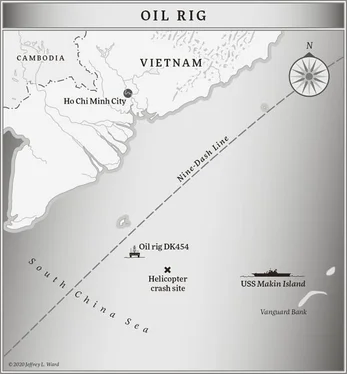“And we’re sure we don’t?” Ryan asked. “One of your operatives doesn’t have him on ice at some Busan safe house right now waiting for the heat to blow over?”
“That possibility did cross my mind,” Foley said. “Liu Wangshu would be a good get, for whoever gets him. He’s privy to all sorts of treasure regarding Chinese submarine technology. But I’ve been assured by station chiefs and DIA assets in that part of the world that we are in no way culpable for this.”
Ryan finished off his coffee and set the mug on the side table, none too gently. “Okay. Then tell me who is culpable.”
“We do not know, Mr. President,” Foley said. “Not yet. There’s a possibility that he’s gone into hiding on his own, wanting to defect. The Chinese want him bad, which means he’s likely holding timely intelligence. If he’s getable, we should get him.”
“Agreed,” Ryan said.
He looked around the room. Everyone present appeared to know something he did not.
Yet.
“Let’s have it,” he said, eyeing Mary Pat.
“Though Professor Liu’s disappearance is problematic, the remainder of VICAR’s communication is far more troubling.” She gave an exhausted sigh. “Sir, it appears we have a mole problem.”
7
“A mole?” Ryan whispered.
The revelation wasn’t a surprise. Wise intelligence organizations operated under the assumption that there was always a mole in their midst. What startled Ryan was that the unflappable Mary Pat Foley, who’d been doing this job since the days of dead drops in Gorky Park and midnight rendezvous in East Berlin, thought the information important enough to bring to him. That meant she believed the mole was highly placed enough to be a real danger.
The KGB had run moles in the U.S. government and the U.S. government ran moles in the KGB. Colonel Mikhail Semyonovich Filatov, cryptonym CARDINAL, became personal friends with Ryan after Ryan had assisted in his extraction from the Soviet Union.
But for the names and faces, nothing had changed.
“According to VICAR’s report, much of his information was verified by a Russian asset working within the Chinese Ministry of State Security. This Russian asset suggested to VICAR that the PRC was checking the depth of U.S. involvement regarding Professor Liu with a source they had embedded within the U.S. intelligence apparatus.”
Ryan rubbed a hand over his hair and fought off a yawn. It was much too early for this.
“Let me get this straight,” he said. “Our asset inside Russian intelligence tells us the Russians have an asset in the People’s Republic of China, who let it slip that Beijing has an asset in our house?”
“That’s correct, Mr. President,” Foley said. “We even know what they call him—SURVEYOR.”
Ryan scratched his chin, thinking that he needed to shave. The incredible irony of the situation was overshadowed by the danger a mole posed to the U.S. case officers and their agents. It didn’t take much more than a hunch in some countries for suspected assets to “accidentally” fall out of a window.
“If SURVEYOR mistakenly believes we have Liu,” Ryan said, “then maybe he’s not that highly placed.”
“Perhaps,” Foley said. “But I get the impression MSS is still in the process of contacting him … or her, to confirm. Newly acquired intelligence sources are among our most compartmented reports. If the Chinese think SURVEYOR has access to that information, at the very least, China believes their mole is in a place to do them some real good. And I don’t mind telling you, that scares me.”
“Containment?” Ryan asked.
Foley nodded. “We’ve already started to subtly wall things off,” she said. “Other than the people in this room, VICAR’s most recent communication has only been shared with four individuals, and VICAR’S identity is extremely close-hold.”
“So,” Ryan said. “A mole hunt, then. The Bureau and Agency working in a coordinated effort?”
It wasn’t really a question.
Both directors rushed to be the first out with: “Of course, Mr. President.”
The FBI’s drive to build a case for violation of the Espionage Act that would bring a conviction in federal court versus CIA’s overarching desire to protect the intelligence apparatus and plug the leak sometimes brought the two agencies to loggerheads. Mary Pat’s job as director of national intelligence was, among other things, to see that long-fought turf battles didn’t get in the way of the end goal.
Ryan turned to Foley, making it clear that she would be his point of contact.
“Good to hear it. What’s our next move?”
“According to the Russians’ source in Beijing, the PRC is actively hunting a Uyghur woman with some as-yet-unknown connection to Professor Liu.”
“Uyghur,” he mused. Ryan had been a thorn in Beijing’s side of late, taking a political stand against the Chinese surveillance state and the government’s internment of ethnic Uyghur Chinese citizens. Beijing’s official stance was that they were not after the beard or veil, but targeting people who posed a future risk of the “Three Evils”: terrorism, separatism, or religious extremism. From Ryan’s perspective, it was about the closest thing on the planet to a Philip K. Dick novel.
There had been attacks by separatist groups—bombings, knife attacks—but Beijing’s reaction had been crushing and broad. Hundreds of thousands of men and women had been rounded up and held for weeks or months for purposes of reeducation and assimilation into Han Chinese culture. Children, effectively orphaned while their parents were interned, were housed in state schools for indoctrination into a more “Chinese” way of thinking.
“Where’s she from, this Uyghur woman?” Ryan asked.
Foley shot a glance at D/CIA.
“According to VICAR, her name is Medina Tohti,” Director Canfield said. “She’s originally from Kashgar. Her husband was arrested and taken to one of their reeducation camps outside Urumqi. Nothing in the report indicates if he’s alive or dead. At this point, we do not know what her connection is with Professor Liu. As we’ve discussed, he’s something of a playboy. There’s a theory that they may have had an affair at some point. Perhaps when he visited western China.”
“Where are they looking for her?” Ryan asked.
“Word is, she’s joined a Uyghur separatist group,” Foley said. “Something called Wuming. Beijing lists them as a terrorist organization.”
Scott Adler scratched his forehead. “Sorry to interrupt, but you’re sure it’s Wuming ?” The secretary of state was conversant in several languages, among them, passable Mandarin.
“That’s right,” D/CIA said.
“Wuming means ‘nameless,’” Adler said. “It would be like us saying the terrorist group formerly known as al-Qaeda.”
“Anonymous?” Foley asked.
“Yes,” Adler said. “Sort of.”
“That fits,” the FBI director said. “Wuming is on our watch list as well. Beijing says they’re responsible for no less than nine targeted assassinations in western China. They’ve never claimed responsibility or even called their group by name. Beijing links the attacks together because of the MO.”
“And that is?”
“They don’t blow up things indiscriminately or run through a crowded train station with knives. They hunt specific people, much like the Israelis have done.”
“So Beijing gave them the name Wuming ?” Ryan asked. “They don’t use it themselves?”
“Appears so, sir,” the FBI director continued. “No one seems to know where the Wuming operatives are based, but judging from the attacks they’re believed to be responsible for, we think they have to be somewhere in western China between Urumqi and Afghanistan.”
Читать дальше











![Александр Ирвин - Tom Clancy’s The Division 2. Фальшивый рассвет [litres]](/books/417744/aleksandr-irvin-tom-clancy-s-the-division-2-falsh-thumb.webp)
